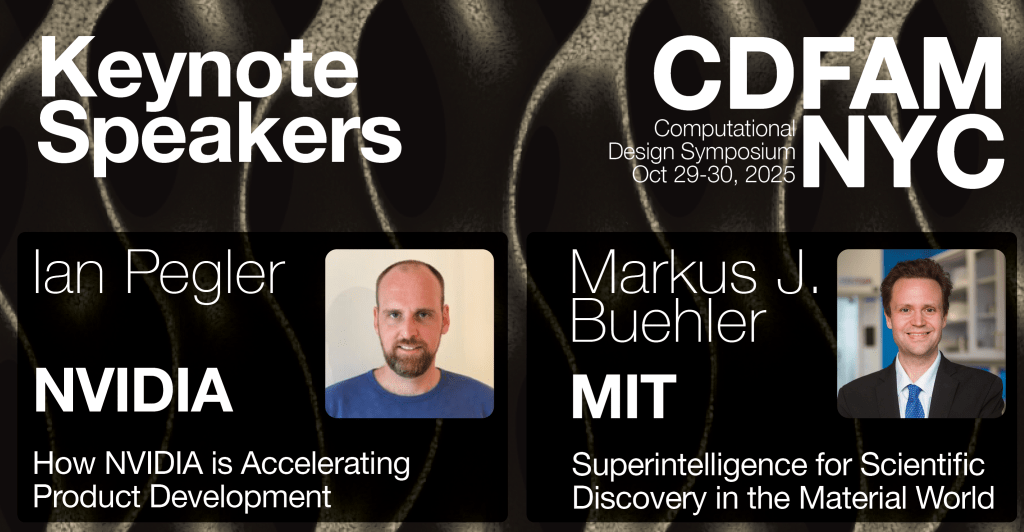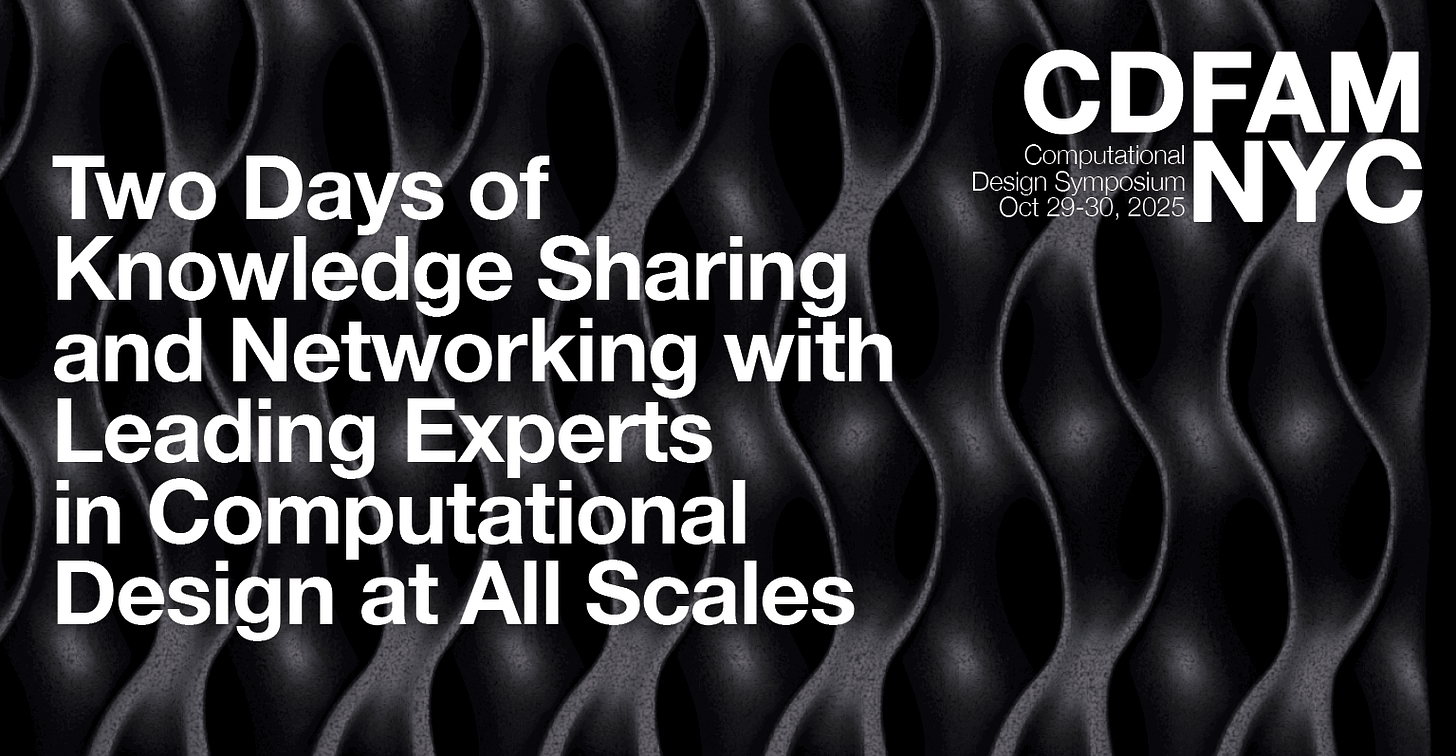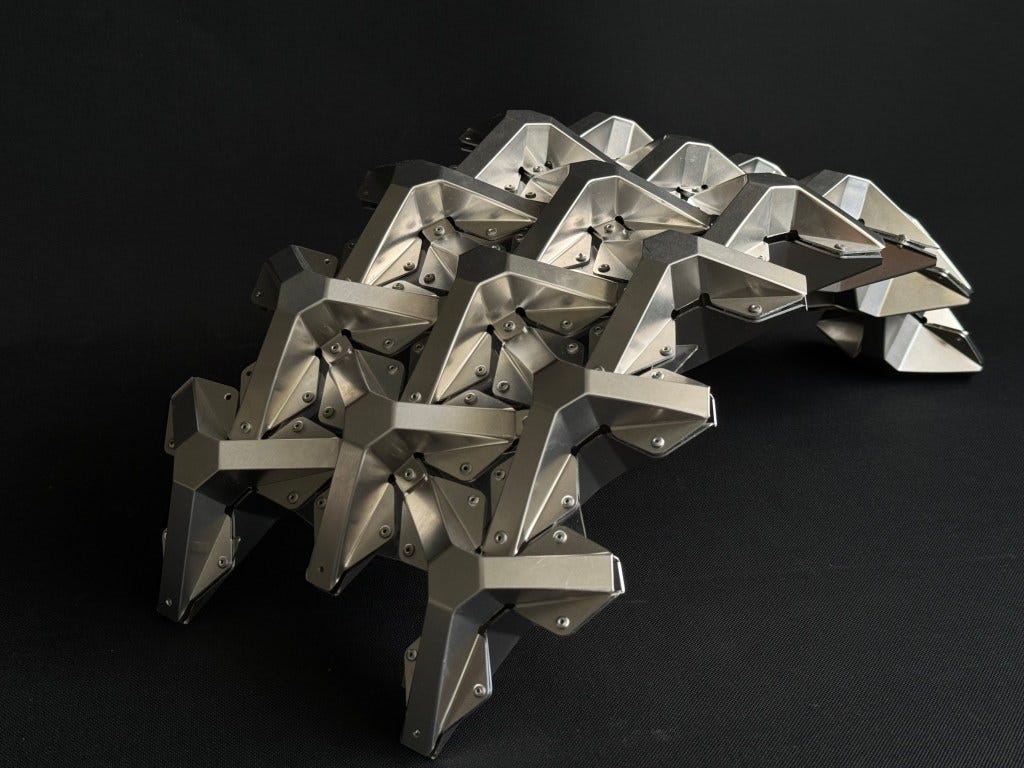Announcing NVIDIA + MIT Keynote Presentations at CDFAM NYC
See the full program
The full program for CDFAM Computational Design Symposium, NYC 2025 is now confirmed, featuring keynote presentations that frame how accelerated computation and AI are reshaping design and engineering at all scales, architected materials, to architectural systems.
Spanning research and practice, the keynote presentations from MIT and NVIDIA will open two days of discussion by tracing a path from the material science frontiers of AI-driven discovery, through the software and machine learning frameworks enabling generative and simulation-based design, to the hardware that delivers real-time feedback and high-fidelity computation. Completing the picture, we will look at the data infrastructures that integrate these elements into scalable, practical workflows.
Keynote Presentations
Ian Pegler – NVIDIA will present how accelerated computing and AI surrogate models enable higher-fidelity simulation and real-time digital twins, transforming product development workflows across aerospace, automotive, energy, and marine industries, powered by their software and hardware platforms.
Markus J. Buehler – MIT will explore AI as an active partner in scientific discovery, introducing reinforcement learning, graph-based reasoning, and multi-agent systems capable of designing new materials and revealing hidden structure–property relationships in engineering and biology.
Together, these keynote perspectives establish a foundation that connects fundamental advances in materials, software, hardware, and data with the applied presentations that follow, showing how computational design methods are implemented in practice across industries, scales, and disciplines.
Themes & Highlights
AI and Machine Learning in Engineering
From simulation acceleration to explainable generative models, AI/ML is (slowly) becoming a core part of engineering practice, influencing not only how simulations are run and optimized but also how problems are framed, solutions are generated, and decisions are made at every stage of the design and development process.
Leaders such as Markus Huntington (PhysicsX), Sai Nelaturi (Infinity-AI), and Luca Zampieri (Neural Concept) from industry, along with academics including Chris McComb (Carnegie Mellon University), Fiona Zhao (McGill University), and David Gerber (University of Southern California), will discuss how these tools are being developed, understood, and integrated into real-world workflows.
Latest Software and Computational Methods
Sessions from Bradley Rothenberg (nTop), Marco Pietropaoli (ToffeeX), Neel Kumar (Intact Solutions), Ali Tamijani (Novineer), and Qiqi Wang with Gregory Roberts (FlexCompute) will showcase how software tools and computational methods shape not only the way we design but also the range of possibilities of what can be made. These sessions highlight workflows for implicit modeling, explainable generative design, CAD-integrated lattice systems, and GPU-native simulation, underscoring the importance of tool development in expanding the boundaries of engineering and design practice.
Processes, Origami Systems, and Architected Materials
Research and real-world applications at the intersection of computational methods and materials will be represented by presentations on kirigami and origami-inspired systems from Tuo Zhao (Princeton University) and Alfonso Parra Rubio (MIT), alongside work from Rachel Azulay (TetMet), Philip Schneider (Scawo3D), and Dan Kling (Foldstar). These talks address how geometry-driven design principles at the micro to macro-scales create architected materials with programmable properties, and how such approaches enable new processes for large-scale manufacturing and construction.
Consumer Products and Wearables
Speakers such as Samuel Whitworth (New Balance), Jesus Marini (Puma), Andrew Sink (Carbon), Will Samosir (VARIANT3D), and Austin Mitchell (Harman International) will show how computational pipelines, lattice optimization, textile simulation, and acoustic modeling are enabling scalable mass customization and performance-driven design in footwear, apparel, and consumer electronics.
Architectural Scale and Structural Systems
Presentations from Sergey Pigach (CORE Studio at Thornton Tomasetti), Gustav Fagerström (Walter P Moore), Steve Reichwein (Severud Associates), Marc Tatarsky (Arup), and Sherif Tarabishy (Foster + Partners) highlight how computational methods are transforming the overall approach to the design of the built environment from a data‑first perspective, moving well beyond the surface treatment of façade design.

Register to Attend - Do Not Miss Out
Across two days, CDFAM NYC will feature experts from academia, industry, and software development sharing advances in computational design at every scale.
With space strictly limited at Newlab, this is a rare opportunity to hear directly from leading researchers and practitioners, see how new tools and methods are being applied across disciplines, and connect with peers shaping the future of design and engineering.
Early registration is strongly recommended to secure your place, do not miss out on this limited opportunity to be part of the discussions shaping the future of computational design.
Dates: October 29–30, 2025
Location: Newlab, Brooklyn Navy Yard, New York
The full program is now live.
We look forward to welcoming you in NYC in October.




